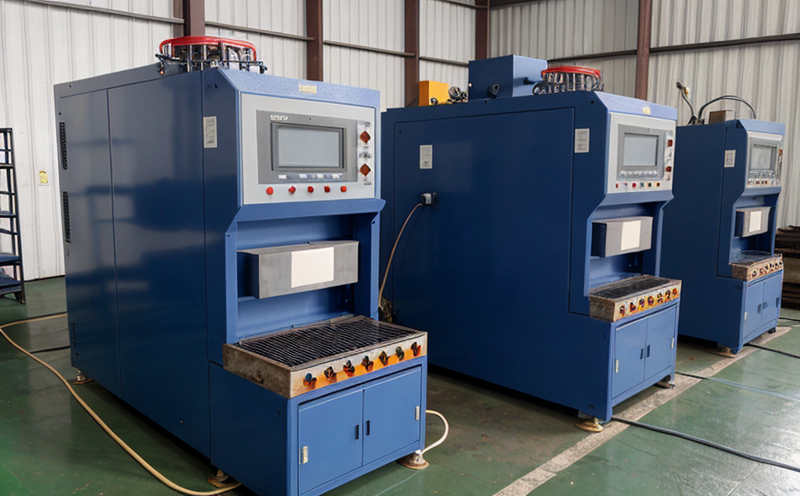IEC 62321 Hazardous Substances in Raw Electrical Materials Testing
The International Electrotechnical Commission (IEC) standard IEC 62321 is a critical tool for ensuring the safety and compliance of electrical equipment. It specifies the requirements for the presence of hazardous substances such as heavy metals, flame retardants, and other potentially harmful compounds in raw materials used in the manufacturing of electrical products.
This testing service is essential for manufacturers operating within the industrial sector to ensure their raw materials meet stringent international standards. By adhering to IEC 62321, companies can avoid the risks associated with non-compliant materials and maintain a positive reputation among consumers and regulatory bodies.
The standard covers a wide range of hazardous substances that are known to pose health hazards or environmental risks when present in electrical products. These include lead (Pb), mercury (Hg), cadmium (Cd), hexavalent chromium (Cr(VI)), polybrominated biphenyls (PBB) and polybrominated diphenylethers (PBDE). The testing process aims to identify these substances at levels that could affect the health of workers, consumers, or the environment.
The testing procedure involves sampling raw materials from suppliers and conducting detailed chemical analysis using sophisticated instrumentation such as ICP-MS (Inductively Coupled Plasma Mass Spectrometry) for heavy metals and GC-MS (Gas Chromatography-Mass Spectrometry) for flame retardants. The results are compared against the specified limits set forth in IEC 62321 to determine compliance.
Compliance with this standard is not just a legal requirement but also an ethical responsibility. It helps ensure that the products manufactured by industrial plants do not contain harmful substances that could lead to adverse health effects or environmental degradation. The testing service provided ensures that raw materials meet these stringent requirements, thereby contributing to safer and more sustainable manufacturing practices.
Additionally, this testing process supports the continuous improvement of supply chains by identifying problematic materials early in the production cycle. This allows manufacturers to work with suppliers to improve material quality and reduce risks associated with non-compliant inputs. By doing so, companies can enhance their reputation for reliability and integrity while also minimizing potential legal and reputational risks.
The impact of this testing extends beyond individual companies; it contributes to broader industry standards that promote safer and more environmentally friendly practices. This is particularly important in the context of global manufacturing where supply chains often span multiple countries, each with its own set of regulations and standards.
Eurolab Advantages
At Eurolab, our commitment to excellence in testing ensures that we provide unparalleled services for IEC 62321 compliance. Our state-of-the-art laboratories are equipped with the latest technology and methodologies necessary to deliver accurate and reliable test results.
- Precision Instruments: Utilizing advanced analytical instruments like ICP-MS and GC-MS, our lab offers precise measurements of hazardous substances in raw materials.
- Experienced Staff: Our team consists of highly trained professionals with extensive experience in the field of material testing.
- Comprehensive Reporting: We provide detailed reports that include not only test results but also recommendations for improving compliance and enhancing product safety.
- Certified Facilities: Eurolab’s laboratories are certified to ISO/IEC 17025, ensuring the highest level of quality in our testing processes.
- Rapid Turnaround Times: We pride ourselves on providing quick turnaround times without compromising on accuracy or thoroughness.
By choosing Eurolab for your IEC 62321 compliance needs, you gain access to a network of experts who understand the complexities of this standard and can guide you through the testing process. Our services are designed to help your company meet regulatory requirements while also contributing positively to sustainability efforts.
Customer Impact and Satisfaction
The impact of adhering to IEC 62321 standards extends far beyond just meeting legal obligations; it enhances the overall quality and safety of products, which in turn improves customer satisfaction. For our customers who use this service, there are several key benefits:
- Increased Product Safety: By ensuring that raw materials meet stringent safety requirements, we help prevent the introduction of harmful substances into finished products.
- Enhanced Reputation: Compliance with international standards such as IEC 62321 can significantly enhance a company’s reputation among consumers and stakeholders.
- Avoidance of Legal Issues: Non-compliance can lead to costly legal actions and penalties. Our testing ensures that your products are safe from these risks.
- Sustained Competitive Advantage: In an increasingly regulated market, staying compliant with international standards is crucial for maintaining a competitive edge.
Our customers consistently report high levels of satisfaction with our services due to the accuracy and reliability of our test results. They also appreciate the comprehensive nature of our reports, which provide valuable insights into their supply chains and areas for improvement.
In summary, by partnering with Eurolab for IEC 62321 testing, customers can rest assured that they are taking proactive steps towards ensuring product safety and compliance with international standards. This not only protects their brand but also contributes to a more sustainable future.
Environmental and Sustainability Contributions
The impact of IEC 62321 testing goes beyond just individual companies; it plays a crucial role in promoting environmental sustainability at both the corporate and industry levels. By ensuring that raw materials do not contain hazardous substances, manufacturers can significantly reduce their environmental footprint.
- Reduction in Toxic Emissions: Non-compliant materials often lead to toxic emissions during manufacturing processes. IEC 62321 testing helps minimize these risks by identifying and eliminating harmful substances early on.
- Sustainable Resource Management: By using compliant raw materials, companies can contribute to more efficient resource management practices, which are essential for sustainable development.
- Eco-friendly Manufacturing Processes: Ensuring compliance with IEC 62321 can lead to the adoption of eco-friendly manufacturing processes that reduce waste and energy consumption.
In conclusion, Eurolab’s testing services play a vital role in supporting global efforts towards environmental sustainability. By helping companies comply with international standards like IEC 62321, we contribute to a cleaner and more sustainable future for all.





